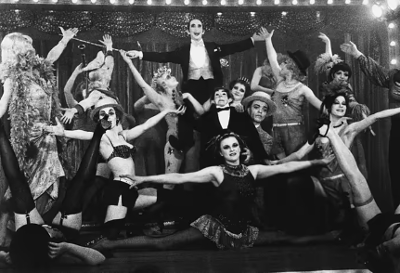The History Cabaret
From its satirical beginnings in 19th-century France to its evolution into a global spectacle, cabaret continues to enchant audiences with its unique blend of music, dance, and theatre.

by Jim Valentine-Burrows, Arts in Libraries Officer.
With its origins rooted in late 19th-century Paris, Cabaret has long been a vibrant and subversive form of entertainment. Known for its blend of music, comedy, drama, and social commentary, cabaret quickly spread across Europe in the early twentieth century, evolving uniquely in each locale.
Upon arrival in the United Kingdom, the form found a distinctive voice that reflected the nation's diverse cultural heritage, satirical wit, and love for intimate venues. As the art form continues to thrive, unexpected places - like libraries - are emerging as ideal spaces to carry cabaret into the future.

A Brief History
Cabaret is a unique form of live entertainment that fosters close connection between performer and audience. With a focus of eclectic style, storytelling and social commentary, Cabaret has always been an artform designed to bring different people together to start conversation.
In the UK, the genre first gained traction in London's Soho district, where venues like The Café de Paris and The Windmill Theatre became synonymous with glamour, satire, and boundary-pushing performances. During World War II, cabaret flourished as a morale-boosting medium, offering escapism and a platform for sharp political critique.
In this period, performers like Noël Coward and Marlene Dietrich used cabaret as a vehicle for poignant storytelling and cultural resistance. The post-war period saw the rise of variety shows and working men's clubs, which borrowed from cabaret traditions. The late 20th century saw a resurgence, particularly in fringe theatre and comedy circuits kickstarting the careers of artists including Victoria Wood and Lily Savage - often providing space for marginalised communities to share their perspectives in a world dominated by patriarchal views. Events like the Edinburgh Fringe Festival has given cabaret a new platform, incorporating modern influences like drag culture, burlesque, and experimental performance art.
Today, the UK cabaret scene is thriving once more; deeply rooted in community - it is celebrated for its inclusivity, creativity, and willingness to address contemporary issues.

The Future Stage for Cabaret
Here in St Helens - Arts in Libraries we believe that our library venues are unlikely but perfect places to host the unique artform that is cabaret. Here's five reasons why:
1. Libraries aren't just repositories for books; they are hubs for learning, creativity, and community. Hosting cabaret performances aligns with our mission to provide accessible cultural experiences. Cabaret, with its intimate format and focus on storytelling, fits beautifully into this ethos.
2. Libraries are accessible to all, making them inclusive spaces that encourage diverse audiences. Cabaret's ability to combine entertainment with social commentary is particularly well-suited to the democratic nature of libraries. Performers can address topical issues in a space that welcomes all members of society, regardless of background or income.
3. Historically, libraries and cabaret share common ground as spaces of subversion and intellectual exploration. Just as libraries & archives preserve radical literature and foster dialogue, cabaret challenges conventions and provokes thought through performance. Pairing the two creates a synergy between the cerebral and the emotional, offering audiences a unique experience.
4. From meeting rooms to cozy reading nooks, Libraries have spaces that can easily be transformed into pop up cabaret stages. These settings allow for the close performer-audience connection that defines cabaret, while also offering local artists accessible venues to share and test new work in the heart of their communities.
5. Cabaret performances in libraries can appeal to a wide range of age groups, bringing together younger audiences curious about alternative art forms and older generations who may have nostalgic connections to the cabaret traditions of the past.

A New Chapter?
Libraries and cabaret may seem like an unlikely pairing, but in truth, they share a deep, historical connection as spaces that celebrate creativity, challenge norms, and build community. Here in St Helens, our Arts in Libraries programme is built around this ethos - so putting cabaret in libraries feels obvious to us.
As the U.K. cabaret scene continues to grow, bringing its humour, glamour, and poignancy to libraries can help this vibrant art form reach new audiences and remain a vital part of local British culture. By hosting cabaret performances, libraries can ensure that this historically rich and socially relevant art form continues to thrive—not just as entertainment, but as a beacon of connection and expression for local communities.
In short, you could think about Cabaret as kind of cultural pick & mix - a unique type of performance event where there will always be something for everyone. Cabaret can be provocative (but it never takes itself too seriously). It can appear frivolous (but it's serious about its silliness). It's an easy, accessible way to dip your toes into something new (it's also guaranteed to be a fun night out to enjoy with friends - and make new ones ).
Join us for our Winter Cabaret Spectacular at Eccleston Library on Saturday 14th December & find out for yourselves - tickets are available HERE
Suggested reads available at St Helens Library.

A life worth living : acting, activism & everything else / Tommy Jessop. By: Jessop, Tommy.
Image Credits: Angela Wilkinson
Main Image : Master of Ceremonies (Joel Grey): "In here, life is beautiful. The girls are beautiful. Even the orchestra is beautiful!" -- from Cabaret (1972) directed by Bob Fosse





